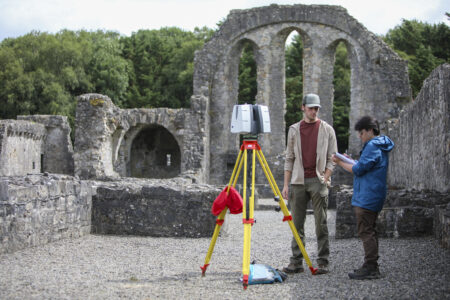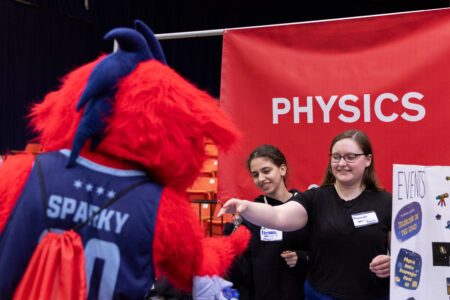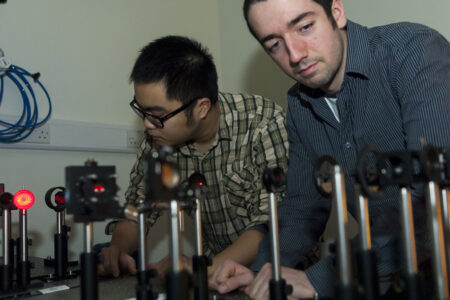
As physicists revisit longstanding theories and introduce bold new ideas, the boundaries of what we understand about the universe continue to expand. From the quantum realm to the scale of galaxies, physics remains a dynamic force — constantly evolving and redefining the future.
Last year reflected just how alive this evolution is. In April, the world witnessed a solar eclipse, the last sighting being in 2017. The United Nations also declared 2025 the International Year of Quantum Science and Technology, marking a century since quantum mechanics first began to reshape modern physics with breakthroughs like Heisenberg’s matrix mechanics and Schrödinger’s wave equation.
As science reflects on its past milestones, a new generation of physicists prepare to shape what comes next. And with the right mentorship and education, they can push the frontiers of knowledge in everything from thermodynamics to quantum computing. That’s precisely what these leaders in physics and applied physics offer:
The Hong Kong Polytechnic University
The future of science is being shaped inside the state-of-the-art facilities at the Hong Kong Polytechnic University. That’s why it’s been recognised as the 47th best university in the world for nanoscience and nanotechnology by the US News & World Report, and 72nd for materials science by QS World University Rankings 2025 by Subject. Another contributing factor to this prestige is the fact that since 1987, its Department of Applied Physics has been the launchpad for high-calibre professionals ready to drive scientific breakthroughs.
The department’s latest offering –– the BSc (Hons) in Physics programme –– equips students with both depth and versatility. It begins with a common first-year curriculum, before students uniquely choose a secondary major in either Artificial Intelligence and Data Analytics (AIDA) or Innovation and Entrepreneurship (IE). This dual-major approach ensures graduates are technically proficient but also aligned with the future needs of industry.
“I am impressed by how the programme integrates essential 21st-century skills into a dynamic curriculum,” says student Zainab Fayyaz. Indeed, the programme is enriched by the expertise of PolyU’s global scholars — 12 of whom were recognised as the world’s top 2% of scientists by Stanford University in 2024. With their guidance, students dive headfirst into innovative research projects with access to cutting-edge technologies in 30 world-class research laboratories.
“Students enjoy an enhanced learning experience,” Fayyaz says. “The Department also offers dynamic interest groups that foster collaboration and exploration.”
The programme’s application-oriented approach to learning is why PolyU graduates are so well-rounded. They’ve developed the scientific, practical, and soft skills to build a successful career, with access to cutting-edge projects in five major research areas, collaborations with renowned universities and industry partners, and student exchange opportunities. From a joint AI laboratory with Huawei to the University Research Facility in Materials Characterisation and Device Fabrication — there’s no limit to the chances you’ll get to think like a scientist and act like an innovator.
Upon graduating, you’ll follow in the footsteps of countless PolyU graduates finding solutions to real-world challenges across industries –– from system architects in technology to quantitative researchers in medical services to product engineers in manufacturing. If you’d like to get your gears turning, check out the BSc (Hons) in Physics at PolyU today.

Imperial College London is home to one of the largest physics departments in the UK. Source: Imperial College London/Facebook
Imperial College London, Department of Physics
Join Imperial College London, a world-class university that is ranked sixth in the QS World University Rankings 2023. The Department of Physics is one of the most diverse and active physics research centres in the world and you will have access to state-of-the-art facilities and the option to tailor your learning with a wide range of optional modules. You’ll get to explore as far as the edges of the solar system, the edges of the universe and reality, and the edge of knowledge when you join this diverse community of pioneers, creators, and innovators.
The Department of Physics attracts some of the brightest and most talented budding physicists from all over the world. The BSc Physics is a three-year degree that provides logical thinking along with numerical and problem-solving skills to solve the problems of tomorrow, impress a wide range of employers and allow graduates to embark onto some of the most prestigious careers today. If you are aiming for more physics experience, you can follow it up with a one-year postgraduate MSc course or choose one of the four-year MSci programmes from the outset.
Along this journey, you’ll get to be part of a vibrant community of over 350 clubs and societies and a student body representing over 140 countries. Imperial is the seventh most international university in the world. Step beyond campus and you’ll be in London, the global academic capital, with more world-class institutions and resources than any other city in the world, and Europe’s most multicultural city, welcoming people from all backgrounds. This makes for a rich and collaborative living and learning environment that’ll take your creativity, perspectives, and problem-solving skills to another level.

Yale students work on cutting-edge research projects alongside their faculty members as early as their junior year. Source: Yale University/Facebook
Yale University, Department of Applied Physics
The Department of Applied Physics at Yale University forges the path to academic and industrial success for students looking to innovate with science and technology. Based in Connecticut, the Ivy League institution is ranked #9 among the best physics schools in the nation, according to the US News & World Report. Learning is made practical, covering topics across condensed matter physics, optics, and quantum information to stay ahead of technological growth.
The undergraduate Applied Physics major equips students with the skills to use their fundamental science knowledge to solve real-world problems. Hands-on experiences are the beating heart of the curriculum. Students get involved in cutting-edge projects from the junior year, collaborating with world-renowned faculty beyond the Department of Applied Physics, from the Yale School of Medicine to the Department of Chemistry.
The curriculum covers core courses like Electronic Waves and Devices, Statistical Thermodynamics, and Quantum Mechanics to build your fundamental grasp of physics principles. Later, you’ll have the option to tailor your electives and research projects to fit your interests and career goals, and even undertake two terms of independent research.
Research at the Department of Applied Physics aims to shape the future of science and technology to improve the world we live in today. In 2023 alone, the university raised over US$1.326 billion in research and development expenditures — a testament to the faculty’s dedication to innovation. Students in applied physics have access to world-class research centres and institutes where funded, groundbreaking projects occur.
*Some of the institutions featured in this article are commercial partners of Study International










